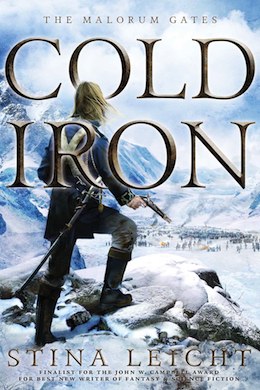Cold Iron is Stina Leicht’s third novel. With it, Leicht moves away from urban fantasy and towards epic in the new gunpowder fantasy mode. Cold Iron is the opening volley in The Malorum Gates series—and to judge from the amount of ground this novel covers, it’s a series that’s going to do a lot of epic in a relatively short space of time.
It is also a rather better, and strikingly less boring, book than its opening pages portend.
Cold Iron opens with Nels, a kainen crown prince—the kainen are a race of people taller than the human norm, all possessed of varying degrees of magical powers, including the ability to magically force other people to do their will, simply by instructing them to—who initially comes across as self-absorbed, spoiled, whiny and ineffectual. Nels’ only distinguishing factor is his lack of the command magic that is especially characteristic of the royal family of Eledore. But fortunately—for the reader, if not for Nels—tragedy strikes! Disbarred from the succession and forced into the army due to Eledorean taboos on the shedding of blood, Nels becomes approximately fifty times more interesting, and so does the novel. With his twin sister Suvi, her naval ambitions interrupted to take up the role of crown princess, and Nels’ friend and lover, the apprentice healer-sorceress Ilta, added to the cast of point-of-view characters, Cold Iron rapidly progresses towards very entertaining indeed.
Flawed—of which more later—but very entertaining.
Nels, Suvi, and Ilta are faced with an intransigent array of problems: an invasion by the resolutely unmagical but technologically more adept humans of Acrasia; a smallpox epidemic made worse when magic goes wrong; and the machinations of Nels and Suvi’s paternal uncle Sakari, who seems determined to take the reins of power into his own hands—at no small cost to Nels, Suvi, and Eledore itself. As Nels struggles with the responsibilities of military life, including hostile senior officers, enemy action, insufficient supplies, and men who don’t trust him, Suvi must navigate court life and a mission at sea to acquire an alliance with the Waterborne nations, while Ilta is put under house arrest when her attempt to inoculate herself against smallpox gives rise to a magically more potent strain.
The war with Acrasia is going badly, and Nels’ commanding officer is a sociopath. Meanwhile, among the Waterborne, Suvi has to deal with assassination attempts, a magical duel, and battles at sea. And in the background lurks an ancient danger, against which—it appears—only the Eledorean royal family can stand. As the Acrasian forces close in around Eledore’s plague-wracked capital, Nels, Suvi, and Ilta are reunited in their nation’s darkest hour. If they cannot avoid their uncle’s betrayal and stand against the Acrasians, they’ll just have to save what they can.
In Cold Iron, Leicht has written an approachable, entertaining epic fantasy, peopled with engaging characters and replete with dramatic incidents. I confess that lately I’ve been having a spot of argument with epic fantasy: most of the time I want it to be either less boring or less full of deeply unlikeable people. Fortunately, despite its length, Cold Iron avoids the worst perils of droning epic fantasy, and its characters, despite our initial introduction to Nels, are anything but unlikeable.
But Cold Iron has its flaws. Leicht has a tendency to skip large chunks of time between chapters, and to signal these cuts only sketchily, with little summary of anything that has taken place in the intervening weeks or months. This is a little annoying. Also on the annoying side is my feeling that Leicht has got sea battles and life at sea all wrong—but it’s been some time since I’ve sailed on a tallship, or even sailed at all, so one should not take my word for it.
Cold Iron might not be the very best example of epic fantasy around: I’m not inclined to rave about its prose or polish, and it is working with some familiar tropes—plus gunpowder. It remains to be seen whether or not the next volume is going to break new ground. But Cold Iron is plenty entertaining, and it’s good enough that I’m definitely looking forward to finding out where the story goes next.
And may I just mention here that the new Saga Press imprint is being impressively consistent with the quality of its releases to date? Not all of them are my cup of tea, but they are all recognisably solid examples of their kind—at least the ones I’ve encountered so far.
Cold Iron is available now from Saga Press.
Liz Bourke is a cranky person who reads books. Her blog. Her Twitter.










